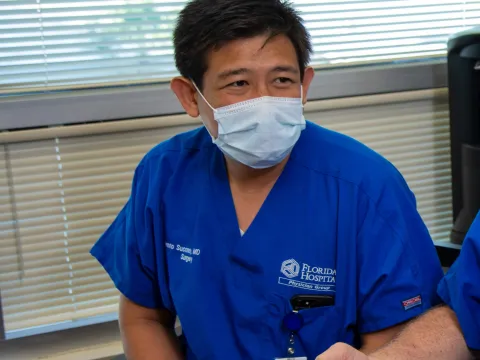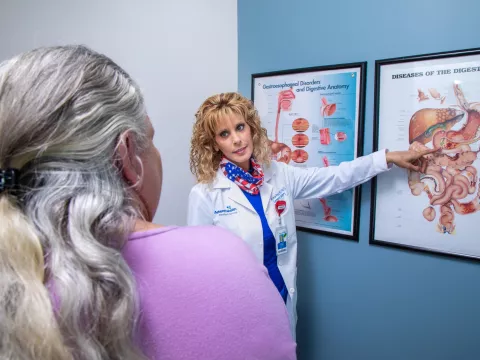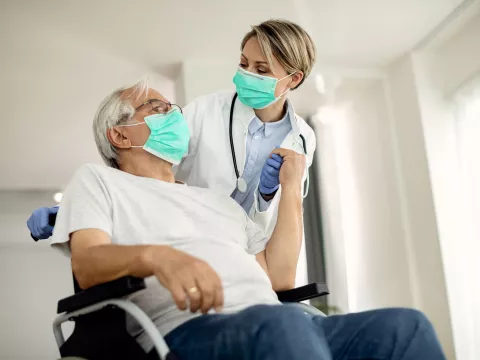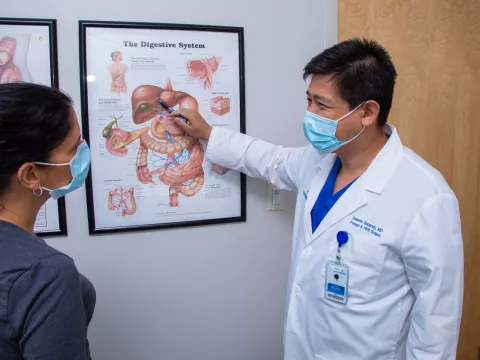- AdventHealth Digestive Health Institute
Advanced HPB surgeons with clinical and research fellows from the AdventHealth Digestive Institute Tampa presented and moderated sessions at the annual meeting of the Americas Hepato-Pancreato-Biliary Association (AHPBA). This year’s conference had approximately 1,000 attendees and was held on March 5 – 8, 2020, at the Loews Miami Beach Hotel. The meeting’s theme of “2020 Vision – Focus on Evidence and Integrated Care” had an aim towards teaching other HPB surgeons and other medical specialists how to improve their care for patients with liver, pancreas and biliary system – gallbladder and bile duct – conditions.
Sharona Ross, MD, FACS, Advanced Foregut and HPB Surgeon, was a panelist for a session on Controversies in Minimally Invasive Hepatopancreaticobiliary Surgery and an invited presenter for the “How I Do It: Pancreatic Anastomosis” session. In this session, Dr. Ross discussed how she uses the surgical robot to reconnect the pancreas to the digestive system following a procedure to remove the head of the pancreas. This prestigious invitation was extended to Dr. Ross in recognition of her being a thought leader in pancreatic surgery. Dr. Ross and her colleagues, Alexander Rosemurgy, MD, FACS, Advanced Foregut and HPB Surgeon, and Iswanto Sucandy, MD, FACS, Advanced HPB Surgeon, perform a very high volume of pancreatic operations each year. In fact, the Digestive Institute is one of the nation’s leading centers for robotic pancreatic surgery, making them uniquely qualified for giving other surgeons insight into how to perform these operations.
In addition, Dr. Rosemurgy and Dr. Sucandy each moderated a session at the AHPBA meeting. Dr. Rosemurgy oversaw the Oral Presentation session on Biliary Disorders, primarily focused on bile duct disorders and repairs to bile duct injuries. Dr. Sucandy moderated a video session about “interesting liver resections,” to remove parts of the liver that were particularly challenging or unique.
The Digestive Institute’s HPB Surgical Fellow, Gabriel Rivera, MD, presented two videos at the meeting. One video was about the first-ever documented robotic surgery to remove a rare cancer of the bile ducts inside the liver called cholangiocarcinoma (it’s a technically difficult procedure, which has only been done open until now). However, by using the robot, the Digestive Institute Tampa surgeons are able to give patients an opportunity to have a minimally invasive procedure. This allows the patient to recover more quickly and begin the next phase of cancer treatment sooner.
The other video Dr. Rivera presented was about a minimally invasive repair of a patient’s bile duct after it was severed during a routine cholecystectomy (gallbladder removal). Gallbladder removal is the most common surgical procedure, and patients have come to expect minimally invasive gallbladder surgery, which has been offered in the U.S. for three decades now. In the rare event of complications, surgeons need to convert to open surgery, leaving the patient with a long scar and a more difficult recovery. However, our surgeons are able to repair the patient’s injured bile duct with the robot, that allow them to benefit from a minimally invasive approach: small scars, less pain and a faster recovery.
Kenneth Luberice, MD, Clinical Research Fellow at the Digestive Institute, also presented at the meeting how robotic liver surgery helps improve outcomes for patients regardless of the complexity level of the procedure. By using IWATE criteria to determine the complexity of each of 105 liver operations performed with the robot, two procedures were categorized as low difficulty, 31 as intermediate, 49 as advanced, and 23 as expert. Traditionally, patients having low and intermediate liver operations would have better outcomes and fewer complications than those having advanced and expert procedures. The Digestive Institute found that while the advanced and expert liver operations performed with the robot took more time than the less complicated ones, patient outcomes were similar. In other words, patients having more complex liver operations had outcomes in line with those that were technically simpler, and the surgical robot made all the difference.
If you or a loved one needs liver, pancreatic, gallbladder or bile duct surgery, our surgeons, Drs. Ross, Sucandy and Rosemurgy at AdventHealth Digestive Health Tampa have the right experience and skills to provide optimal outcomes. To schedule an appointment, call
Call813-615-7030.





